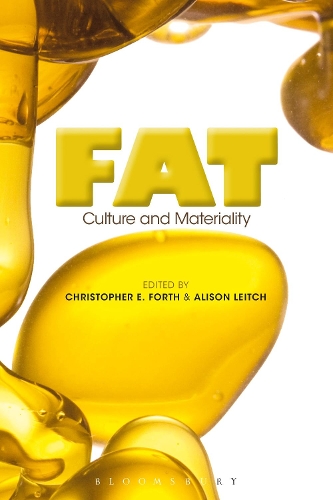
Fat: Culture and Materiality
(Paperback)
Available Formats
Publishing Details
Fat: Culture and Materiality
By (Author) Dr Christopher E. Forth
Edited by Dr Alison Leitch
Bloomsbury Publishing PLC
Bloomsbury Academic
1st May 2014
United Kingdom
Classifications
Tertiary Education
Non Fiction
306.4
Physical Properties
Paperback
208
Width 156mm, Height 234mm
327g
Description
"Fat". In contemporary society the word never fails to elicit powerful emotions, especially as it relates to bodily health and appearance. But fat is a noun as well as an adjective and has a cultural life outside of its relationship with the human body. By focusing on the complex physical and experiential dimensions of this problematic substance, Fat: Culture and Materiality breaks new ground in the study of the relationship between culture and the material world. With contributions from well-respected international scholars, this innovative and interdisciplinary collection will appeal to a wide range of readers interested in fat and its relationship to culture, materiality and lived experience. The volume addresses the role of fats in a variety of cultural settings. Topics include the politics of Palestinian olive oil; the allure of pig fat in heritage pork; the material sources of fat stereotypes in classical and biblical texts; the use of harvested fat in aesthetic surgery; and the status of fat in the self-narratives of anorexics.
Reviews
A welcome addition to fat appreciation, the contributions in this book highlight fat as a substance that slides, sizzles, glistens, oozes, lubricates, stains, melts, coats, congeals, and splats. The examples are compelling, the analysis is rich and the writing is entertaining. Upon reading this book, I had an insatiable urge to sip some cleansing olive oil tea and eat a barbequed pork chop. * Don Kulick, University of Chicago, USA *
FAT: Culture and Materiality offers a compelling and insightful interdisciplinary exploration of the complexities, properties and potentialities of fat as a substance located both within and outside of bodies. The authors traverse a fascinating range of themes and, deftly reveal how the materiality of fat and oils interconnects with some of the most pressing issues of our time, from eating disorders, semiotic and religious qualities of oil, to the idea that fat can be productive and has biovalue. It is a timely and unique contribution to related fields such as body studies, fat studies and critical weight studies. * Emma Rich, University of Bath, UK *
In examining the context of fat in culture, contributing authors present a multitude of fat concepts based on lived experiences; historical underpinnings; sociocultural significance; religious, biblical, and spiritual connections; political implications; societal standards; and health consequences. They explore the role of fat through a global and cultural lens, providing unique and fascinating dimensions that continue to influence human relationships with this shape-shifting substance through language, perceptions, and behavior. Editors Forth and Leitch have successfully brought together a variety of perspectives on how ideas of fat as a construct, lived experience, stigmatized identity, and health factor have influenced and continue to shape the manner in which people relate to each other and their environments. This innovative compilation of fat history, attitudes, and narratives will provide an excellent adjunct to upper-level disciplines with sociological, psychological, health science, gender, and cultural foci. Summing Up: Recommended. Upper-division undergraduates and above. -- R. James, Governors State University * CHOICE *
Fat: Culture and Materiality is a valuable volume for portraying a new way to think about a subject that, for most Americans, is only about 'obesity.' In keeping with the current state of the social sciences, it illustrates that we cannot think of fator any other substance or objectmerely as an idea or symbol (to extend Beuys's point, substances and objects are not purely retinal or mental) but must attend to their felt (including tasted) qualities. To paraphrase (or overturn) Levi-Strauss, fat is not just good to think with but is also good or bad to experienceto have on and under your skin or on your tongue. -- David Eller * Anthropology Review Database *
Author Bio
Christopher E. Forth is the Howard Professor of Humanities & Western Civilization and Professor of History at the University of Kansas, USA. Alison Leitch is a social anthropologist who teaches in the cultural sociology program at Macquarie University in Sydney, Australia.
